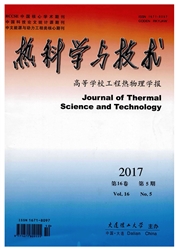

 中文摘要:
中文摘要:
气相声速是流体重要的热物理性质之一,在科学研究以及工程应用中具有重要的价值,但是样品中杂质对声速测量有着重要的影响。建立了杂质在低压下对气相声速测量影响的数学模型,揭示了杂质对纯工质声速的影响主要与其摩尔质量、比定压热容及摩尔成分相关,并且以惰性气体、丙烯、丙烷、异丁烷和二氧化碳中所含典型杂质为例进行了分析。结果表明,摩尔质量或比定压热容高于待测工质的杂质,会给声速测量带来负偏差,反之带来正偏差,并且杂质与工质的摩尔质量或比定压热容相差越大,对实验结果的影响越大。
 英文摘要:
英文摘要:
Gaseous speed of sound is an important thermophysical property and has important applications in science and engineering. However, impurity significantly affects the acoustic measurement accuracy. A model for effects of impurity on acoustic measurement was present in this paper. The effects of impurities on measured speed of sound were related to the molar masses, specific isobaric heat capacities and molar fractions of impurity and sample. The effects of impurities on measured speed of sound of inert gases, propylene, propane, isobutane and CO2 were analyzed using the model. The results indicate that the measured speed of sound shows negative deviation when the mole mass or specific isobaric heat capacity of impurity is higher than that of the sample, otherwise, the measured speed of sound shows positive deviation.
 同期刊论文项目
同期刊论文项目
 同项目期刊论文
同项目期刊论文
 Using a two-capillary viscometer with preheating to measure the viscosity of dilute argon from 298.1
Using a two-capillary viscometer with preheating to measure the viscosity of dilute argon from 298.1 Effects of participating media on the time-resolved infrared measurements of wall temperature in a c
Effects of participating media on the time-resolved infrared measurements of wall temperature in a c Radiative properties and heat transfer characteristics of fiber-loaded silica aerogel composites for
Radiative properties and heat transfer characteristics of fiber-loaded silica aerogel composites for 期刊信息
期刊信息
